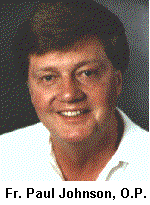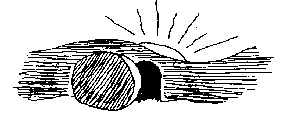

Father Paul Johnson is a member of the Dominican Community of St. Albert the great Priory, Minneapolis, Minnesota, and a popular retreat director.

The Easter Triduum is three days of festival celebrating the death and resurrection of Jesus, celebrating what God is doing in and for us.The Triduum celebrates a three-fold gift of Jesus to us: In the Lord's Supper, Jesus offers us the gift of his body and blood, his personal presence, to make us one with him and with each other.
In handling over his life on the cross for us, Jesus gives us the gift of total love, overcoming the power of death and sin.
In rising from the dead, Jesus gives us new life, union with him.
The following reflection is on Jesus' gift of total love given to us from the cross.
THE EMBRACE OF LOVE
"Love one another as I love you. No one has greater love than this, to lay down one's life for one's friends."(Jn 15:12-13). Jesus' death on the cross for us is a gift of total love.
Jesus crucified reveals the heart of God
the pain of God
the forgiveness of GodJesus crucified draws us into the depth of God's love, how far God will go in loving, dying even for those who mock, ridicule, and reject the embrace of God's love.
Jesus crucified draws in the outsider: the bandit/robber, the Roman centurion.
Jesus crucified gathers together the shattered part of our individual lives and heals us with tenderness.
That was always your way, dear Jesus. You were there at the center of others' suffering.
Your first action on the first day of your public ministry in the synagogue in Capernaum, on the sabbath (Mk 1:21-26), was to confront an unclean spirit, a spirit resisting God. You confront and expel that evil which distorts and bedevils human life. The spirit shrieks,"What have you to do with us, Jesus of Nazareth? Have you come to destroy us?"
Yes! I have come to destroy you.
Yes! I have come to overcome all that oppresses, imprisons, and destroys human life.This is the good news, the Gospel in miniature in this first action. Your life, Jesus, was one continuing exorcism: confronting the energies of destruction and oppression; giving us your energy that lifts burdens and gives life.
When you was the widow of Nain ready to bury her only son, her only support, you step forward, raise the young man and personally give him back to his mother.
You go with Jairus, and raise to life his twelve-year-old daughter, and with tenderness tell them to giver her something to eat.
You see the crowds who stir your heart to pity. You tell the disciples, tell us, feed them. The disciples, we say we have so little food. You say feed them: whatever you have is enough, more than enough when you connect what you have with me.
We begin to see that your suffering and passion begin, not on the cross, but in the daily sufferings of the world. Our pain is your pain. Our affliction is your affliction. You are enfleshed in our broken lives. We see how you act when faced with suffering.
You were teaching in a synagogue (Lk 13:10ff). You see a woman crippled for 18 years by a spirit--bent over, completely incapable of standing erect. You see her. Your heart embraced her in her affliction. You could not stand to see this crippling of her life. You called to her, "You are set free!!!" and you lay your hands on her.
"Wait a minute!" says the synagogue leader to the crowd of people. It's the sabbath. You have six days to come, six days to seek healing, six other days, come on those days to be cured, but not today. It is the sabbath!
We hear you say, Jesus, "You hypocrite! You care for your animals on the sabbath; you lead them to water. What about this woman? Eighteen years of affliction!"
God's way is to set her free now, not tomorrow. The sabbath is to honor God. What greater honor to God than to free the afflicted.
Another sabbath you are on your day to dine with a leading Pharisee. You see a man with dropsy. You ask the religious leaders. Is it lawful to heal on the sabbath? They are silent. Why Silent? Why hesitate to answer? Is it not obvious? God wants us free.
Yes, Jesus, you help us see God's care in you. Yet it is so hard for us to see
to receive,
to respond to your love.
Drawing Close to the Cross
From a Norman Crucifix of 1632 (Charles Causley) we hear you say:
I am the great sun, I am your counsel, but you do not see me. but you do not hear me. I am your husband, I am the lover but you turn away. whom you will betray. I am the captive, I am the victor, but you do not free me. but you do not cheer me. I am the truth, I am the holy dove but you will not believe me. whom you will slay. I am the city, I am your life, where you will not stay but you will not name me. I am your wife, your child, Seal up your soul with tears but you will leave me. and never blame me. I am the God to whom you will not pray.You appeal from the cross to us. To receive your total love, to take your love into our hearts.
Jesus, you invite us to draw close. You invite us to be with the bandits on the crosses next to you. One mocks, the other rebukes him. We are justly condemned, but this man is just. We receive what is worthy of what we did. Nothing this man did deserves death.
Hearing these words, we hear again the returning son, "I have sinned against heaven and earth, forgive me"(Lk 15:21). And we hear Paul's words, "God loved us when we were still sinners, yes, Christ died for us" (Rom 5:7-8).
How did one bandit see God's love in you and the other miss it?: One sees your love and says, Jesus. the only place recorded in the Gospels where you are called Jesus. You were usually addressed as teacher, rabbi, Master, Lord. But he says,Jesus.
Jesus, total sincerity,
Jesus, total openness,
Jesus, remember me.Somehow this man knows your heart and will soon hear what you had told your disciples the night before:"I go and prepare a place for you. I will come and take you to myself. W*here I am, you will be"(Jn 14:2b-3).
Jesus, remember me. Today, Today, today, you will be with me in paradise.
At your feet next to the cross stands the Roman centurion. What did he see? How did he grasp your love for all? So close, he saw the manner of your death.
Did he see the signs of God's acceptance of your offering of your life for us; the veil of the temple rent, the upheaval of the earth, the tombs open? Or did he simply see the manner of your death, your love embracing all people, your total love, which led him to exclaim: "Truly, this was the Son of God."
At a distance are others,
passersby who mock and move on,
others who are good people who look on,
some are your followers,
who will believe later,
to whom you will later appear.How important it is for us to be close to your cross, your total gift of love for us, your life handed over for us to have new life. Only when we are close to the cross and see the manner of your death, can we too say, truly this was God's son. Only when we are close to the cross can we hear with the bandit, today, this day, you will be with me, not on a cross but in paradise.
One other often drew near to your cross, Thomas Aquinas. He tells us that he learned more there at the foot of the cross than in all his study. You spoke to him and said, Thomas, you have written so well of me. What do you want? And Thomas said, Only you, only yourself, dear God.
Help us draw close to you on the cross, help us stay close and see your gift of total love.
where we can see and remember boundless love,
where we can hear, You will be with me,
where we see no greater love, the greatest love--your life given for us.

© 1995, Emmanuel Magazine, 5384 Wilson Mills Road, Cleveland, OH 44143-3092
Fr. Paul Johnson O.P., 2833 32nd Avenue S., Mineapolis MN 55406-1689 (612) 724-3644 ext.22.